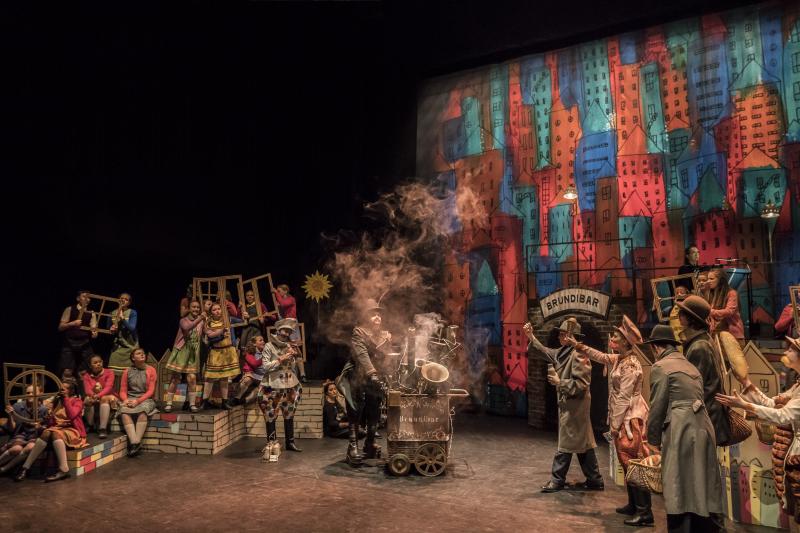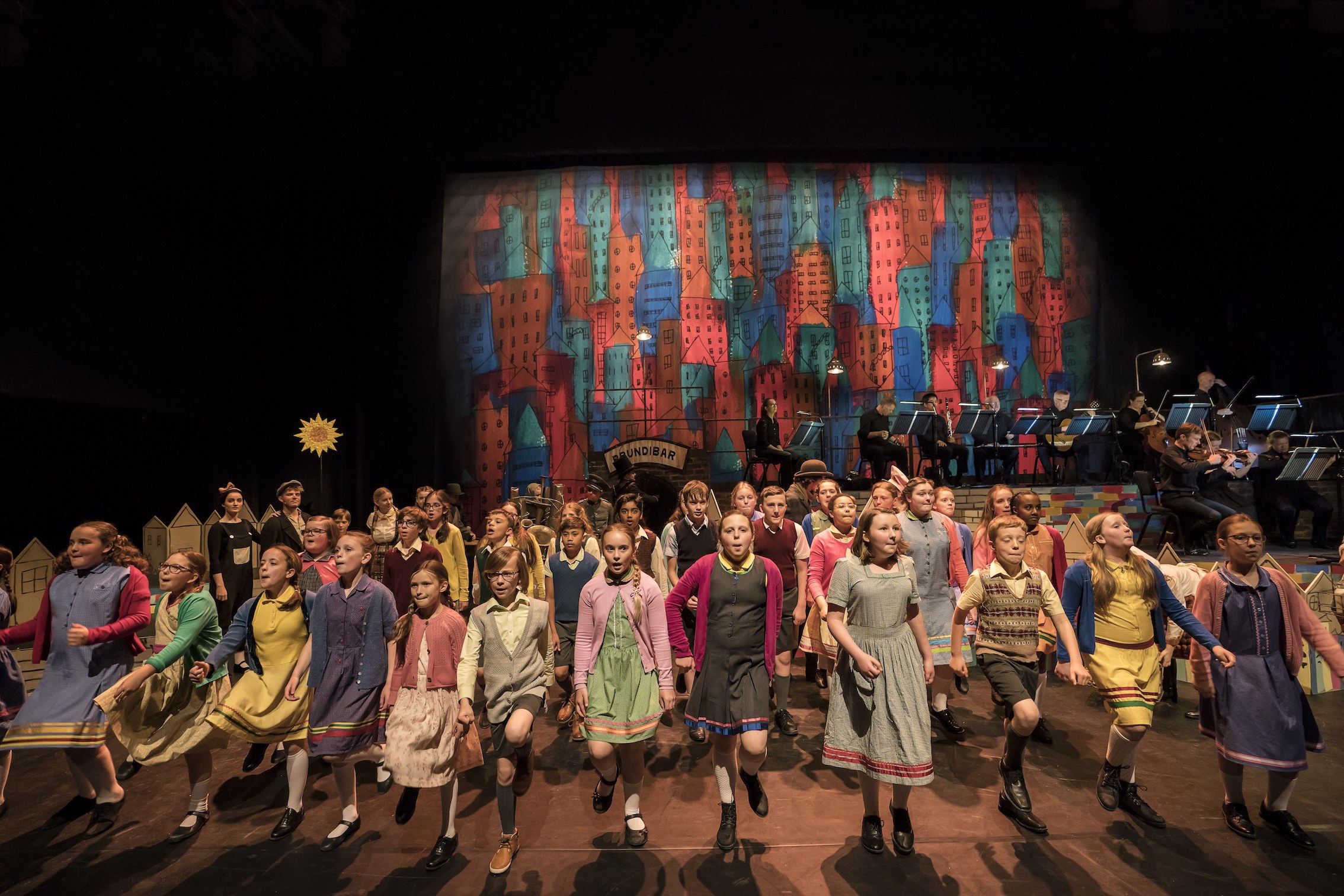Brundibár, Welsh National Opera review - bittersweet children's opera from the ghetto | reviews, news & interviews
Brundibár, Welsh National Opera review - bittersweet children's opera from the ghetto
Brundibár, Welsh National Opera review - bittersweet children's opera from the ghetto
Theresienstadt operetta brilliantly sung, wittily staged

Politics, in case you may not have noticed, has been in the air of late: questions of escape, release, borders, refugees, things like that. So WNO’s June season of operas about freedom has been suspiciously well timed.
To fit Hans Krása’s children’s operetta Brundibár into this topical gallery takes some special pleading, because although the piece itself ends happily, almost all the participants in the first performance of the definitive version (Theresienstadt, 1942) later died in Auschwitz, including the composer.
The Czech Krása had composed this half-hour fairy tale about two children who get the better of a thieving organ-grinder, with the help of a bird, a cat, a dog and a minor army of street urchins, in 1938 for a competition that never actually materialised. After an initial performance in a Prague Jewish orphanage in 1942, the performers all reconvened (unwillingly) in the Theresienstadt concentration camp, where Krása rewrote his score for the small, heterogeneous group of instrumentalists unfortunate enough to be available. The result, recreated under such terrible circumstances, is a minor masterpiece of simple musical fun, beautifully conceived for child performers, tuneful, exquisitely scored for its curious band (four violins, cello, bass, flute, clarinet, trumpet, piano, guitar, accordion and percussion), and without a trace of condescension.  The performance, by WNO Youth Opera conducted with intense commitment by WNO’s music director Tomáš Hanus and wittily staged by David Pountney and designer Bethany Seddon, was beyond praise. I’d love to mention every single member of the cast, but dare not, because the production was double cast, with no indication in the programme as to who was singing which of the three performances. But for the benefit of the children especially, I saw the five o’clock Sunday performance, and thought it superb, with choral singing of immaculate precision and unstinting enthusiasm.
The performance, by WNO Youth Opera conducted with intense commitment by WNO’s music director Tomáš Hanus and wittily staged by David Pountney and designer Bethany Seddon, was beyond praise. I’d love to mention every single member of the cast, but dare not, because the production was double cast, with no indication in the programme as to who was singing which of the three performances. But for the benefit of the children especially, I saw the five o’clock Sunday performance, and thought it superb, with choral singing of immaculate precision and unstinting enthusiasm.
Watching and hearing children sing and act in this way is one of life’s great pleasures, and I’m thinking of the soloists as much as the chorus. I’ve not the slightest doubt that the other two performances were as good. The little orchestra (grown-ups) likewise played with supreme energy and polish.
In itself Brundibár (the name of the organ-grinding villain) is quite unpretentious; it was written and performed to lift the spirits of children and grown-ups in unknown, frightening peril, but makes no grandiose point about good conquering evil. It’s Hansel and Gretel cut down and transplanted to the ghetto. But it still seems hard to stage such a work without contextual embroidery. On the landing outside the Weston Studio of the Wales Millennium Centre was a touching exhibition of children’s paintings from the camps, and as we filed into the theatre we were all decked out with yellow neck bands by way of solidarity with the Jewish victims. At the end of the show there was a brief documentary film about Brundibár at Theresienstadt, and finally Hanus (whose mother sang in the Theresienstadt performance but somehow escaped with her life) gave a moving personal testimony of working on the piece and how it fulfilled a desire of many years.
One day, though, we shall listen to Krása and other holocaust victim-composers (Ullmann, Gideon Klein, Pavel Haas) without these appendixes, which – to put it mildly – are not essential. Krása was a highly gifted composer of chamber music, songs, and music for the stage, music of a specifically Jewish tone, recognisably in the tradition of Mahler, Schoenberg and Kurt Weill, yet completely individual and with a métier and aural sophistication at least the equal of theirs. The tragedy is that his life was cut short and much of his music lost. But enough remains to show us what might have been. Brundibár is merely a bittersweet way in.
The future of Arts Journalism
You can stop theartsdesk.com closing!
We urgently need financing to survive. Our fundraising drive has thus far raised £49,000 but we need to reach £100,000 or we will be forced to close. Please contribute here: https://gofund.me/c3f6033d
And if you can forward this information to anyone who might assist, we’d be grateful.

Subscribe to theartsdesk.com
Thank you for continuing to read our work on theartsdesk.com. For unlimited access to every article in its entirety, including our archive of more than 15,000 pieces, we're asking for £5 per month or £40 per year. We feel it's a very good deal, and hope you do too.
To take a subscription now simply click here.
And if you're looking for that extra gift for a friend or family member, why not treat them to a theartsdesk.com gift subscription?
more Opera
 Tosca, Welsh National Opera review - a great company reduced to brilliance
The old warhorse made special by the basics
Tosca, Welsh National Opera review - a great company reduced to brilliance
The old warhorse made special by the basics
 BBC Proms: The Marriage of Figaro, Glyndebourne Festival review - merriment and menace
Strong Proms transfer for a robust and affecting show
BBC Proms: The Marriage of Figaro, Glyndebourne Festival review - merriment and menace
Strong Proms transfer for a robust and affecting show
 BBC Proms: Suor Angelica, LSO, Pappano review - earthly passion, heavenly grief
A Sister to remember blesses Puccini's convent tragedy
BBC Proms: Suor Angelica, LSO, Pappano review - earthly passion, heavenly grief
A Sister to remember blesses Puccini's convent tragedy
 Orpheus and Eurydice, Opera Queensland/SCO, Edinburgh International Festival 2025 review - dazzling, but distracting
Eye-popping acrobatics don’t always assist in Gluck’s quest for operatic truth
Orpheus and Eurydice, Opera Queensland/SCO, Edinburgh International Festival 2025 review - dazzling, but distracting
Eye-popping acrobatics don’t always assist in Gluck’s quest for operatic truth
 MARS, Irish National Opera review - silly space oddity with fun stretches
Cast, orchestra and production give Jennifer Walshe’s bold collage their all
MARS, Irish National Opera review - silly space oddity with fun stretches
Cast, orchestra and production give Jennifer Walshe’s bold collage their all
 Káťa Kabanová, Glyndebourne review - emotional concentration in a salle modulable
Janáček superbly done through or in spite of the symbolism
Káťa Kabanová, Glyndebourne review - emotional concentration in a salle modulable
Janáček superbly done through or in spite of the symbolism
 Buxton International Festival 2025 review - a lavish offering of smaller-scale work
Allison Cook stands out in a fascinating integrated double bill of Bernstein and Poulenc
Buxton International Festival 2025 review - a lavish offering of smaller-scale work
Allison Cook stands out in a fascinating integrated double bill of Bernstein and Poulenc
 Tosca, Clonter Opera review - beauty and integrity in miniature
Happy surprises and a convincing interpretation of Puccini for today
Tosca, Clonter Opera review - beauty and integrity in miniature
Happy surprises and a convincing interpretation of Puccini for today
 Hamlet, Buxton International Festival review - how to re-imagine re-imagined Shakespeare
Music comes first in very 19th century, very Romantic, very French operatic creation
Hamlet, Buxton International Festival review - how to re-imagine re-imagined Shakespeare
Music comes first in very 19th century, very Romantic, very French operatic creation
 Falstaff, Glyndebourne review - knockabout and nostalgia in postwar Windsor
A fat knight to remember, and snappy stagecraft, overcome some tedious waits
Falstaff, Glyndebourne review - knockabout and nostalgia in postwar Windsor
A fat knight to remember, and snappy stagecraft, overcome some tedious waits
 Salome, LSO, Pappano, Barbican review - a partnership in a million
Asmik Grigorian is vocal perfection in league with a great conductor and orchestra
Salome, LSO, Pappano, Barbican review - a partnership in a million
Asmik Grigorian is vocal perfection in league with a great conductor and orchestra
 Semele, Royal Opera review - unholy smoke
Style comes and goes in a justifiably dark treatment of Handelian myth
Semele, Royal Opera review - unholy smoke
Style comes and goes in a justifiably dark treatment of Handelian myth

Add comment